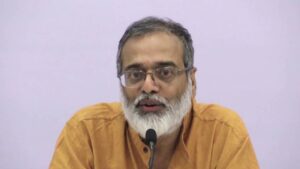Chomsky: US Sanctions On Iran Don’t Support The Protests, They Deepen Suffering
Protests have been raging in Iran since mid-September in response to the death of Mahsa Amini, the 22-year-old Kurdish-Iranian woman who died in a hospital in Tehran after being arrested a few days earlier by Iran’s morality police for allegedly breaching the Islamic theocratic regime’s dress code for women. Protesters are widely describing her death as murder perpetrated by the police (the suspicion is that she died from blows to the body), but Iran’s Forensic Organization has denied that account in an official medical report.
Since September, the protests — led by women of all ages in defiance not only of the mandatory dress codes but also against gender violence and state violence of all kinds — have spread to at least 50 cities and towns. Just this week, prominent actors and sports teams have joined the burgeoning protest movement, which is reaching into all sectors of Iranian society.
Women in Iran have a long history of fighting for their rights. They were at the forefront of the 1979 revolution that led to the fall of the Pahlavi regime, though they enjoyed far more liberties under the Shah than they would after the Ayatollah Khomeini took over. As part of Khomeini’s mission to establish an Islamic theocracy, it was decreed immediately after the new regime was put in place that women were henceforth mandated to wear the veil in government offices. Iranian women organized massive demonstrations when they heard that the new government would enforce mandatory veiling. But the theocratic regime that replaced the Shah was determined to quash women’s autonomy. “In 1983, Parliament decided that women who do not cover their hair in public will be punished with 74 lashes,” the media outlet Deutsche Welle reports. “Since 1995, unveiled women can also be imprisoned for up to 60 days.”
But today’s protests are a display of opposition not just to certain laws but to the entire theocratic system in Iran: As Frieda Afary reported for Truthout, protesters have chanted that they want “neither monarchy, nor clergy.” And as Sima Shakhsari writes, the protests are also about domestic economic policies whose effects have been compounded by U.S. sanctions.
The protests have engulfed much of the country and are now supported by workers across industries, professionals like doctors and lawyers, artists and shopkeepers. In response, the regime is intensifying its violent crackdown on protesters and scores of artists, filmmakers and journalists have been arrested or banned from work over their support for the anti-government protests.
Is this a revolution in the making? Noam Chomsky sheds insight on this question and more in the exclusive interview below. Chomsky is institute professor emeritus in the department of linguistics and philosophy at MIT and laureate professor of linguistics and Agnese Nelms Haury Chair in the Program in Environment and Social Justice at the University of Arizona. One of the world’s most-cited scholars and a public intellectual regarded by millions of people as a national and international treasure, Chomsky has published more than 150 books in linguistics, political and social thought, political economy, media studies, U.S. foreign policy and world affairs. His latest books are The Secrets of Words (with Andrea Moro; MIT Press, 2022); The Withdrawal: Iraq, Libya, Afghanistan, and the Fragility of U.S. Power (with Vijay Prashad; The New Press, 2022); and The Precipice: Neoliberalism, the Pandemic and the Urgent Need for Social Change (with C.J. Polychroniou; Haymarket Books, 2021).
C.J. Polychroniou: Noam, Iranian women started these protests over the government’s Islamic policies, especially those around dress codes, but the protests seem now to be about overall reform failures on the part of the regime. The state of the economy, which is in a downward spiral, also seems to be one of the forces sending people into the streets with demands for change. In fact, teachers, shopkeepers and workers across industries have engaged in sit-down strikes and walkouts, respectively, amid the ongoing protests. Moreover, there seems to be unity between different ethnic subgroups that share public anger over the regime, which may be the first time that this has happened since the rise of the Islamic Republic. Does this description of what’s happening in Iran in connection with the protests sound fairly accurate to you? If so, is it also valid to speak of a revolution in the making?
Noam Chomsky: It sounds accurate to me, though it may go too far in speaking of a revolution in the making.
What’s happening is quite remarkable, in scale and intensity and particularly in the courage and defiance in the face of brutal repression. It is also remarkable in the prominent leadership role of women, particularly young women.
The term “leadership” may be misleading. The uprising seems to be leaderless, also without clearly articulated broader goals or platform apart from overthrowing a hated regime. On that matter words of caution are in order. We have very little information about public opinion in Iran, particularly about attitudes in the rural areas, where support for the clerical regime and its authoritarian practice may be much stronger.
Regime repression has been much harsher in the areas of Iran populated by Kurdish and Baluchi ethnic minorities. It’s generally recognized that much will depend on how Supreme Leader Ali Khamenei will react. Those familiar with his record anticipate that his reaction will be colored by his own experience in the resistance that overthrew the Shah in 1979. He may well share the view of U.S. and Israeli hawks that if the Shah had been more forceful, and had not vacillated, he could have suppressed the protests by violence. Israel’s de facto Ambassador to Iran, Uri Lubrani, expressed their attitude clearly at the time: “I very strongly believe that Tehran can be taken over by a very relatively small force, determined, ruthless, cruel. I mean the men who would lead that force will have to be emotionally geared to the possibility that they’d have to kill ten thousand people.”
Similar views were expressed by former CIA director Richard Helms, Carter high Pentagon official Robert Komer, and other hard-liners. It is speculated that Khamenei will adopt a similar stance, ordering considerably more violent repression if the protests proceed.
As to the effects, we can only speculate with little confidence.
In the West, the protests are widely interpreted as part of a continuous struggle for a secular, democratic Iran but with complete omission of the fact that the current revolutionary forces in Iran are opposing not only the reactionary government in Tehran but also neoliberal capitalism and the hegemony of the U.S. The Iranian government, on the other hand, which is using brutal tactics to disperse demonstrations across the country, is blaming the protests on “foreign hands.” To what extent should we expect to see interaction of foreign powers with domestic forces in Iran? After all, such interaction played a major role in the shaping and fate of the protests that erupted in the Arab world in 2010 and 2011.
There can hardly be any doubt that the U.S. will provide support for efforts to undermine the regime, which has been a prime enemy since 1979, when the U.S.-backed tyrant who was re-installed by the U.S. by a military coup in 1953 was overthrown in a popular uprising. The U.S. at once gave strong support to its then-friend Saddam Hussein in his murderous assault against Iran, finally intervening directly to ensure Iran’s virtual capitulation, an experience not forgotten by Iranians, surely not by the ruling powers.
When the war ended, the U.S. imposed harsh sanctions on Iran. President Bush I — the statesman Bush — invited Iraqi nuclear engineers to the U.S. for advanced training in nuclear weapons development and sent a high-level delegation to assure Saddam of Washington’s strong support for him. All very serious threats to Iran.
Punishment of Iran has continued since and remains bipartisan policy, with little public debate. Britain, Iran’s traditional torturer before the U.S. displaced it in the 1953 coup that overthrew Iranian democracy, is likely, as usual, to trail obediently behind the U.S., perhaps other allies. Israel surely will do what it can to overthrow its archenemy since 1979 — previously a close ally under the Shah, though the intimate relations were clandestine.
Both the U.S. and the European Union imposed new sanctions on Iran over the crackdown on protests. Haven’t sanctions against Iran been counterproductive? In fact, don’t sanctioned regimes tend to become more authoritarian and repressive, with ordinary people being hurt much more than those in power?
We always have to ask: Counterproductive for whom? Sanctions do typically have the effect you describe and would be “counterproductive” if the announced goals — always noble and humane — had anything to do with the real ones. That’s rarely the case.
The sanctions have severely harmed the Iranian economy, incidentally causing enormous suffering. But that has been the U.S. goal for over 40 years. For Europe it’s a different matter. European business sees Iran as an opportunity for investment, trade and resource extraction, all blocked by the U.S. policy of crushing Iran.
The same in fact is true of corporate America. This is one of the rare and instructive cases — Cuba is another — where the short-term interests of the owners of the society are not “most peculiarly attended to” by the government they largely control (to borrow Adam Smith’s term for the usual practice). The government, in this case, pursues broader class interests, not tolerating “dangerous” independence of its will. That’s an important matter, which, in the case of Iran, goes back in some respects to Washington’s early interest in Iran in 1953. And in the case of Cuba goes back to its liberation in 1959.
One final question: What impact could the protests have across the Middle East?
It depends very much on the outcome, still up in the air. I don’t see much reason to expect a major effect, whatever the outcome. Shiite Iran is quite isolated in the largely Sunni region. The Sunni dictatorships of the Gulf are slightly mending fences with Iran, much to the displeasure of Washington, but they are hardly likely to be concerned with brutal repression, their own way of life.
A successful popular revolution would doubtless concern them and might “spread contagion,” as Kissingerian rhetoric puts it. But that remains too remote a contingency for now to allow much useful speculation.
Copyright © Truthout. May not be reprinted without permission.
C.J. Polychroniou is a political scientist/political economist, author, and journalist who has taught and worked in numerous universities and research centers in Europe and the United States. Currently, his main research interests are in U.S. politics and the political economy of the United States, European economic integration, globalization, climate change and environmental economics, and the deconstruction of neoliberalism’s politico-economic project. He is a regular contributor to Truthout as well as a member of Truthout’s Public Intellectual Project. He has published scores of books and over 1,000 articles which have appeared in a variety of journals, magazines, newspapers and popular news websites. Many of his publications have been translated into a multitude of different languages, including Arabic, Chinese, Croatian, Dutch, French, German, Greek, Italian, Japanese, Portuguese, Russian, Spanish and Turkish. His latest books are Optimism Over Despair: Noam Chomsky On Capitalism, Empire, and Social Change (2017); Climate Crisis and the Global Green New Deal: The Political Economy of Saving the Planet (with Noam Chomsky and Robert Pollin as primary authors, 2020); The Precipice: Neoliberalism, the Pandemic, and the Urgent Need for Radical Change (an anthology of interviews with Noam Chomsky, 2021); and Economics and the Left: Interviews with Progressive Economists (2021).





